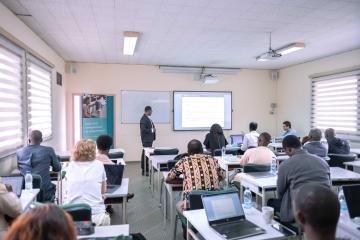
Building a worldwide Alliance for Data, Evaluation, and Policy Training

In January of this year, J-PAL Europe announced a multi-year capacity-building partnership focused on rigorous impact evaluation with the National School of Statistics and Applied Economics of Abidjan (ENSEA) in Côte d’Ivoire, built around J-PAL and MIT Economics’ Data, Economics and Design of Policy (DEDP) MicroMasters. Last week, the partnership reached an important milestone: The first cohort of Ivorian civil servants to participate in the partnership’s program graduated.
At the event, Pascaline Dupas, Scientific Director of J-PAL Africa, officially welcomed ENSEA as a founding member of the new Alliance for Data, Evaluation, and Policy Training (ADEPT)—alongside J-PAL and ENSEA staff and Ivorian and French government partners.
Convened by J-PAL and Community Jameel, the ADEPT network is united by a shared vision: to empower the next generation of researchers, policymakers, and practitioners with the tools and ambition to innovate, test, and scale effective policies and programs to improve the lives of billions.
Concretely, ADEPT brings together universities, training institutions, research centers, governments, and philanthropic organizations to create new and innovative academic pathways and programs that develop essential skills in policy evaluation and data analysis.
The ENSEA model

Photo Credit: Sandeep Kr. Singh
The partnership between J-PAL Europe and ENSEA in Côte D’Ivoire, with support from the Ivorian government and the French Development Agency (AFD), exemplifies the collaborative initiatives that define ADEPT partnerships. The joint effort in Côte d’Ivoire provides new learning opportunities for Ivorian students and civil servants: students receive scholarships and tailored support to take DEDP courses, and civil servants can apply to participate in training that combines in-person programming and an online course from the DEDP program.
Since the start of the program for ENSEA students in Fall 2023, 33 students have earned a total of 71 DEDP course certificates, and four of them have earned the complete MITx MicroMasters credential. Two students were recently accepted to continue their studies in the Paris School of Economics’ Public Policy and Development master’s program.
To start the training program, Ivorian civil servants first applied to participate in an in-person training—adapted from J-PAL’s Evaluating Social Programs short course—that focused on developing a foundational understanding of rigorous evidence generation and use. The accepted cohort then continued to build upon their knowledge by receiving scholarship support to complete The Challenges of Global Poverty online MicroMasters course.
The civil servants then participated in a multi-day, in-person “incubator” workshop in May 2024, where each participant began developing a randomized evaluation to better understand the impacts of a real policy or program being implemented by their ministry. The training program concluded with last week’s colloquium events, which served as a formal graduation ceremony and opportunity for the civil servants to present their evaluation projects from the incubator to a wider audience. The program’s second cohort also participated in their own incubator workshop with ENSEA and J-PAL staff last week.
Thus far, 62 civil servants representing 16 ministries have been or currently are being trained through the civil servants training program, and half of these civil servants hold leadership positions in their respective ministries. Looking ahead, we are exploring the development of a new master’s program anchored by ENSEA focused on rigorous impact evaluation and featuring DEDP course content.

Photo Credit: Sandeep Kr. Singh
Future ADEPT partnerships
The ENSEA model was designed to be responsive to the needs of Ivorian students and civil servants at all levels and across all ministries. Partnerships through ADEPT are flexible by design and are driven by partners’ needs and ambitions.
They can be broadly structured around three partnership models, working with universities and training institutions to:
- Facilitate the use of the DEDP MicroMasters credential as part of their admissions processes (e.g. referencing performance in DEDP online courses, and receipt of the credential, as an indicator of an applicant’s potential to succeed in their academic program);
- Offer degree program credit for DEDP MicroMasters course completion, which may give students the opportunity to apply for expedited or blended programs at universities within the ADEPT network; and
- Leverage DEDP content to help partners expand existing or new residential degree programs.
Across these models, the DEDP MicroMasters serves as a common foundation for exchange and collaboration, providing Alliance members with access to high-quality technical courses that equip learners with the ability to grapple with some of the world’s most pressing problems from a rigorous, data-driven perspective.
Beyond ENSEA, we are working with universities, governments, and other institutions worldwide to expand the ADEPT network and create new models that will empower researchers and decision-makers to use evidence to solve complex policy problems. We are seeking new partners to breathe life into this vision, help shape it, and put it into action. If you are interested in learning more about ADEPT or exploring possible partnerships, contact us at [email protected].




